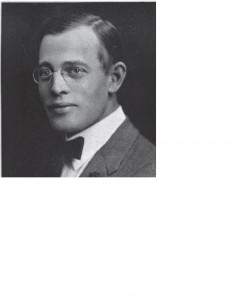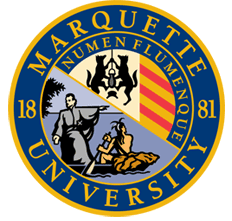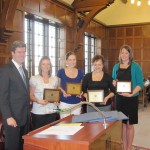John McDill Fox and the Idea of Catholic Legal Education
 John McDill Fox was the first member of the Marquette Law School faculty to have attended Harvard Law School and the first to be hired as a dean at another law school. With his colleague Carl Zollman, he founded the academic field of aviation law, and unlike his faculty colleagues at Marquette, he believed that there should be such a thing as a distinctive “Catholic” legal education.
John McDill Fox was the first member of the Marquette Law School faculty to have attended Harvard Law School and the first to be hired as a dean at another law school. With his colleague Carl Zollman, he founded the academic field of aviation law, and unlike his faculty colleagues at Marquette, he believed that there should be such a thing as a distinctive “Catholic” legal education.
Fox was born in Milwaukee on January 3, 1891. Both of his parents had deep ties to the legal and political history of Wisconsin. His father, Dr. William Fox, was a surgeon and the grandnephew of William Fox, one of the signers of the 1848 Wisconsin Constitution. His mother, Narcissa McDill, was the daughter of Alexander McDill, a former Wisconsin congressman.
Fox was initially educated in public schools in Milwaukee, but at age nine, he was sent away to enroll in the preparatory department at Notre Dame University in South Bend, Indiana. At age 14, he moved up to the college and graduated with a bachelor of arts degree in 1909. After graduating, he accepted a position as a teacher at St. Edward’s College, a small Roman Catholic institution in Austin, Texas. Even by the standards of the early twentieth century, becoming a college professor at age 18 was quite precocious, although it is likely that Fox taught primarily in the school’s college preparatory division.
In the fall of 1910, he enrolled at Harvard Law School where he was a member of the John Marshall Law Club (an organization that sponsored moot court competitions but was essentially social) and one of the founders of the Harvard University Wisconsin Club. He graduated in 1913, and was admitted to the bar in Massachusetts. He began practice in Boston, initially as a lawyer in the offices of the firm of Whipple, Sears, and Ogden, a prominent local law firm. However, after a year there, he began his own practice, specializing in admiralty law. In 1914, he married Elsa Sonnenmann, the daughter of a Neenah, Wisconsin tobacconist who had emigrated to Wisconsin from Germany after the turn of the century.
In 1916, the Foxes returned to Milwaukee, and after securing admission to the Wisconsin bar in June, Fox established his own admiralty law practice in the city. In the spring of 1919, Fox was hired to teach a course in maritime law at the Marquette Law School. That same year, new Association of American Law School rules required all member schools to have at least three full-time faculty. Because Marquette had previously relied upon a full-time dean (in 1919, Max Schoetz) and part-time faculty, it was necessary to appoint two new full-time faculty members. One of the appointments went to Fox. (The other went to the little remembered Willis Lang.)
From 1919 to 1930, Fox taught a variety of courses at the law school. He also served as faculty adviser to the law review for many years, and regularly published book reviews for that publication. He also contributed a number of articles to the journal on topics ranging from trusts to chattel mortgages, and from bar admissions to the role of law review articles in litigation. In the 1920’s, Fox and his colleague Carl Zollman developed the field of aviation law as a serious academic discipline (although most of the scholarly writing was done by Zollman).
Fox was also the teacher of a popular bar review course in an era when the diploma privilege had not been extended to Marquette (and, in fact, both Fox and Marquette Dean Max Schoetz wanted the diploma privilege abolished). It appears that in the fall of 1923, Fox also tutored the famous athlete, performer, civil rights activist, and then law student Paul Robeson, who was on leave from Columbia Law School so that he could play football for the Milwaukee Badgers, then a member of the National Football League.
Although Mrs. Fox was a Lutheran, Fox himself was a devout Roman Catholic, a member of the Knights of Columbus, and a frequent speaker on Catholic subjects. While he did not publish his views on the topic during his time at Marquette, Fox had strong views on the subject of Catholic legal education. An advocate of a distinctive Catholic approach to law study, this position placed him somewhat at odds with his colleagues Schoetz and Zollman. Although a Catholic himself, Schoetz regularly pointed to the non-denominational character of the law school, emphasizing that while Marquette University was a Catholic institution, the law school was not. (Zollman, the author of several works on the law of religious institutions, was also an ordained Lutheran minister.) When Schoetz was killed in a collision with a railroad train while on his way to the 1927 Law School Commencement, apparently no thought was given to replacing him with a Roman Catholic, and the position instead went to Schoetz’s law partner, Clifton Williams, who was a Quaker.
In 1930, the Catholic University of Washington, D.C., which was committed to the idea of a distinctive Roman Catholic form of legal education, had an opening for a dean, and Fox was offered the position. The June 19, 1930 article in the Milwaukee Journal reporting that Fox had accepted the position also noted that Fox planned to retain his house in Milwaukee where he would spend the summers.
Catholic University had spent the previous two years searching for an appropriate dean, and the university’s rector, Bishop James H. Ryan, was initially delighted with the choice of Fox, reporting to the university trustees “that the Law School has again been put on the road originally outlined by the late Dean Robinson, to produce a learned, scholarly, and cultured Catholic bar.” At the time of his appointment the law school at Catholic University was on life support. It was clearly the least successful school in the District of Columbia, and in the year prior to Fox’s appointment, it had neither admitted a new student nor graduated an existing one.
As dean, Fox dramatically raised the law school’s standards. He instituted a requirement that all entering students have a baccalaureate degree, at a time when only seven other law schools had such a requirement. (Marquette, like most law schools in 1930, required two years of college work for entering students.) He also increased the requirements for graduation and required all students to spend at least 18 hours a week in the law library. He abolished the moot court, but replaced it with a law club and a legal aid society.
In regard to making the law school more scholarly and more distinctively Roman Catholic, he incorporated the Washington-based Riccobono Seminar of Roman Law into the law school. He also placed a new emphasis on the development of what he called “theophilosophical” jurisprudence as the underpinning of the law course at Catholic University.
Writing to one of his former professors, Harvard Law School’s Joseph Beale, shortly after assuming the office of dean, Fox observed: “This being a Catholic University, we are stressing wherever possible Scholastic Philosophy and Neo scholasticism. We feel that there has been no attempt on the part of the Catholic law schools to do anything in this regard heretofore, except possibly by certain selected courses in what is usually called “natural law,” or “Jurisprudence.” Our plan is to integrate what we can into the various courses, rather than segregate the subject matter.” Although he did not mention Marquette in his letter to Beale, he was clearly describing his former university which did in most years offer a course on national law taught by a priest from the Marquette Theology Department.
Fox’s activities at Catholic University were not limited to religious matters. He established an aviation law institute at Catholic and served on the Aeronautical Law Committee of the American Bar Association. Additionally, in 1932, he was one of the founders of the Academy of World Economics in Washington, D.C., and he later served on the National Council on Naturalization and Citizenship
Unfortunately, Fox’s effort to turn his new law school into a Roman Catholic Harvard fell victim to his problems with alcohol which apparently plagued him throughout his adult life. In 1934, he was placed on probation by the University because of issues related to excessive drinking, and when the problems persisted, he was asked to resign in 1935. When he failed to do so, he was discharged, and the locks were changed on his office door at the order of the same university rector who had praised his appointment five years earlier. To the embarrassment of both Fox and the university, the “locking out of his office” incident was widely publicized by newspapers throughout the region.
After his discharge as dean, Fox remained in Washington and went to work as a trial examiner for the Food and Drug Administration. He issued a number of important rulings in that capacity, and was still in that position when he died unexpectedly on April 18, 1940, at the age of 49. He was survived by his wife and three daughters.
By the time of his death, he appeared to be largely forgotten at Marquette, although the Marquette Law School had actually taken a “Catholic turn” in 1934 with the appointment as dean of Francis Xavier Swietlik, who held undergraduate, graduate, and law degrees from Marquette.


